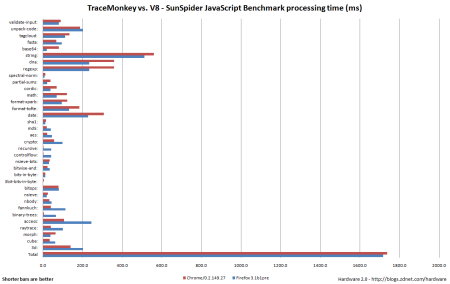Is Firefox faster than Chrome?

Today Mozilla hit back at claims that Google's Chrome browser outperforms Firefox by releasing benchmark results that show that Firefox 3.1 is faster at executing JavaScript that Google's offering.
The tests were run by Brendan Eich, Mozilla's Chief Technology Officer, and these tests show that Mozilla's new TraceMonkey JavaScript engine is faster than Google's V8 engine.
Two tests were run, one under XP running on a Mac Mini and the other with Vista running on a MacBook Pro. In these tests the TraceMonkey engine beat V8 by 1.28x and 1.19x respectively.
I decided to replicate the test on my own test platform (running Windows Vista Ultimate 32-bit) because the last time I tried benchmarking the TraceMonkey engine with SunSpider, the test crashed. This time I didn't have such issues.
Note: Here are the browser versions: - Mozilla Firefox (JIT compiler enabled) - Mozilla/5.0 (Windows; U; Windows NT 6.0; en-US; rv:1.9.1b1pre) Gecko/20080905031348 Minefield/3.1b1pre - Google Chrome - Official Build 1583Mozilla/5.0 (Windows; U; Windows NT 6.0; en-US) AppleWebKit/525.13 (KHTML, like Gecko) Chrome/0.2.149.27 Safari/525.13
In this test Mozilla's TraceMonkey engine beat Google's V8 engine, but by only 1.01x, nowhere near the 1.28x to 1.19x that Eich claims. Not sure whether to put this down to differences in the OS (my install is a clean install that I use exclusively for benchmarking JavaScript) or the fact that he ran the tests on Apple hardware or maybe it's just the effect of a different build.
Note: Check out the results for yourself - TraceMonkey|V8.
I also ran both browsers through Google's V8 benchmark test.
Here Google's V8 engine beat TraceMonkey by a whopping margin - 12.8x.
There's no doubt that there's a lot of work going on optimizing JavaScript engines, and this is going to be good for web developers because they'll be able to do things that couldn't be done before, and it's good for the end user who can get more done in less time.
